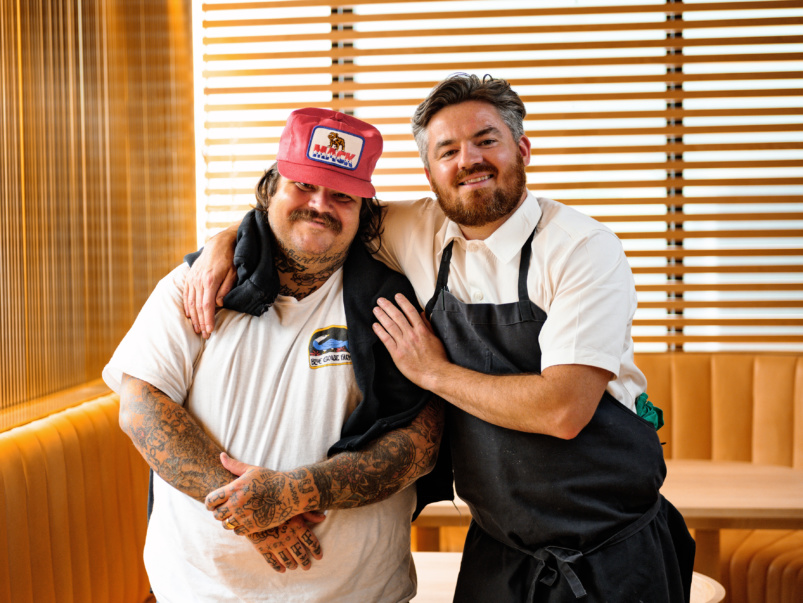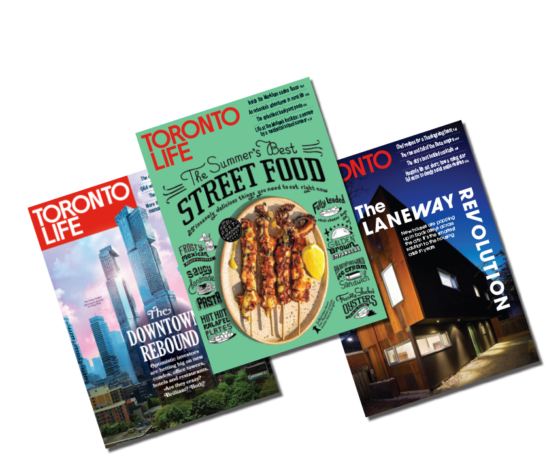“There were waist-high piles of manure”: How this Toronto couple turned an old Prince Edward County dairy farm into a craft distillery
The story behind Wild Lot Farm Distillery

In 2018, Ryan Fowler and Taylor McIndless, who had dreams of opening up their own distillery, stumbled upon an old dairy farm in Prince Edward County. But it needed more than just a little elbow grease—days before they got the keys, there were still cows roaming the property and piles of manure in the 3,500-square-foot barn. Two and a half years later, the couple managed to turn the dilapidated property into Wild Lot, a beautiful distillery and events space. Here, Ryan tells us how they did it.
Five years ago, I was working in marketing and brand building for the cannabis industry, and my partner, Taylor, who is a trained chef, was working at a food-and-travel publication. But we had a shared dream: one day, we wanted to start our own hospitality business, specifically something that reflects our lifestyle, values and principles. We started by investing in a small property in Prince Edward County, just 10 minutes north of Picton. We renovated the small house and turned it into an Airbnb.


At the time, we were still living in a condo at Yonge and Eglinton and working in Toronto—we only bought the county property to get our foot in the door of a place we love. We wanted to eventually move and build a life out there, but we thought that goal was years down the line. In the meantime, the Airbnb was a little boost to our income.
Then I was let go from my job. The cannabis industry had been fairly volatile, even before Covid, so it wasn’t a surprise. I took it as a sign—I wasn’t doing what I dreamed of, and it was time for a change.
And then Covid-19 hit. The travel industry ground to a halt, and the magazine Taylor was working for let him go. Like so many other people, we were forced to rethink where we were in our lives and what we wanted to do moving forward. We decided to ride out the lockdown at our county property. We thought it would only be a week or two, but since we were both jobless, we decided to get started bringing our dream to life. So we ended the lease of our Toronto condo, which we had been renting from a family friend, and became permanent PEC residents. Initially, we wanted to build something on our rental property. We already owned it, so why not? But the county wouldn’t let us rezone our property as both a residence and a business.
Just down the road, a 42-acre dairy farm was up for sale. It wasn’t exactly what we had in mind—it was an operating dairy farm and cash-crop business—but everything else was perfect, and it was only five minutes down the road from our house.



At this point, we had settled on the idea of a farm distillery: a space where we could grow all of our grains and craft spirits on-site. There are a handful of distilleries in the county, but we wanted to do something different: make canned craft cocktails with unique flavours using real ingredients—nothing artificial. Alcoholic beverages people can feel better about! And, given that Taylor has always worked in hospitality, it was important to us to incorporate a hospitality component to our business.
We bought the property in March of 2021, excited to get things rolling. But, first, we had to get the barn zoning amended to allow for a farm distillery, which ended up taking sixteen months. While we waited for the approval, we worked on renovating the mid-1800s farmhouse on the property.
Two years and three months later, we were fully licensed and ready to start up production. It took a lot of blood, sweat and tears. When we were first handed keys, there were still cows roaming the space. There were piles of manure up to our waists. The hay in the loft was stacked six feet high, and there was garbage and detritus everywhere from years of operating as a dairy farm.


I should mention here that it’s a massive space. The barn is 3,500 square feet, spread out over two floors—demolition alone took months. Then there was structural work to be done: we needed all new plumbing, an HVAC system and to reboard the exterior. We saved the planks and ended up using them in the interior. We also recycled the farm’s manure cutter and used it as our plumbing line to run water from the toilets to the bathrooms. Finally, the aesthetics needed an overhaul.
It was a pretty tremendous undertaking. We tried to do as much of it ourselves as we could, but we did have to bring in some contractors. We knew it would be challenging, but we definitely underestimated how many obstacles there would be.
To operate a farm distillery, you need to abide by regulations from all three levels of government. You have to go through municipal processes, you need to be licensed through federal excise tax, and you need all your liquor licences. We have about five different sets of licences, including our manufacturer’s excise tax licence and our spirits warehouse licence along with a few other provincial licences, like a retail and tied house licence. We also have a huge list of things we aren’t allowed to do.


It’s one thing to open a tap house or bar, but it’s another thing to actually produce everything guests will be consuming on-site. I have experience in marketing and branding, and Taylor is excellent with flavours, but we’re not distilling experts. So we partnered with Niagara College’s artisan distilling program to develop our spirits and ready-to-drink cocktails. We created eight recipes with their faculty and food scientists and worked with their quality assurance team to shape what our processing facilities would look like, including what size tanks we needed, where they should sit and all our underground infrastructure, including wastewater, sewage and septic systems. These are critical components that people don’t often think of when they want to open a hospitality business.
Then we had to figure out how to source ingredients during the pandemic, when supply chains were an absolute nightmare. We decided to take a principled approach to our ingredients. For instance, we’re using haskap berries, which are grown around the province, in our vodka soda. The black cherries we juice for our gin and soda come from a farm nearby, and we’re using Ontario peaches in a vodka soda with white tea. One of our guard rails is to use only northern cold-climate fruits, so you won’t see things like pineapples or mangoes—or anything else whose importing process leaves a large carbon footprint. We want to be local, and we want to be as good for our planet as we can.
That’s one thing we noticed during the pandemic. Covid really pushed an appreciation for local, especially in PEC, where people really connected with local businesses and gained an appreciation for their immediate environment during a time of hardship and travel restrictions.


We’ve now been open for just over a month, and it’s been great. We’re not in the heart of the Hillier wine region, but so many locals have still come in and supported us. People are thrilled that we’re maintaining the heritage of the farm and its 100-year-old barn. Driving through the county, it’s so common to see old barns in various states of disrepair. We have two huge grain silos on the property that we’ve also restored. People walk up to the front doors and look at them in amazement because they’re a century old and have survived so many of the county’s windy, volatile winters.
Since it was a family-owned farm, the original owners still have a lot of relatives in the area. We’ve had many of them stop in at different times and see the space, and they’re often shocked by how much it has changed. But I think they’re also happy it was restored and not torn down, because before we purchased it, it was heading that way.


Because of our licence, we have to serve food in order to serve alcohol, so we created a beautiful kitchen. A chef we hired backed out at the last minute, so we had to pull together a food program in just a couple of days—thankfully, that’s Taylor’s forte. We’re trying to do approachable, simple items: peameal bacon on a bun with chive aïoli, beef and vegan smash burgers with our Wild Lot secret sauce, and a honey garlic sausage on a bun with Dijonnaise and crispy onions.
Recently, we realized that we had lost sight of how far we’ve come. We’ve had our heads down for years, trying to focus on opening the doors, but when we take a step back, we’re proud. We’re starting to get people to book private events too, like weddings and parties. It’s amazing to see guests fill the space.
When people stopped by at the beginning of the project, they thought we were crazy for taking this on. A barn of this size? A distillery of this size? It’s fun to have them back now and see their disbelief. It’s just starting to sink in that we actually pulled it off.
Wild Lot Farm Distillery, 1990 Fry Rd., Picton, wildlot.ca, @wildlot











